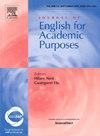Exploring the affordances of generative AI large language models for stance and engagement in academic writing
IF 3.4
1区 文学
Q1 EDUCATION & EDUCATIONAL RESEARCH
引用次数: 0
Abstract
Large pre-trained models like ChatGPT demonstrate remarkable capabilities in generating coherent text across various domains, posing serious implications for teaching academic writing, given the potential for student plagiarism and reliance on software for developing writing skills. However, the linguistic properties and strategies these models employ remain largely unexplored. We investigate how three available large language models (LLMs) express stance and engage with readers in their writing, providing insights into their abilities to produce contextually appropriate and discipline-specific academic writing. 30 academic essays produced by each model were compared with those of human writers on identical topics using detailed prompts, before annotating each text for stance and engagement following Hyland's (2005) taxonomy. Results indicate that LLMs generally use a narrower and more repetitive range of stance and engagement features than human writers, with significant variation also across each LLM. Disciplinary use of stance and engagement is largely in line with human writing except for the philosophy discipline. Implications for teaching academic writing are discussed, particularly regarding identifying potential LLM-related plagiarism and inconsistencies in academic stance and engagement.
探索生成式人工智能大型语言模型在学术写作中的立场和参与的启示
像ChatGPT这样的大型预训练模型展示了在不同领域生成连贯文本的卓越能力,这对学术写作教学产生了严重的影响,因为学生抄袭的可能性和对软件开发写作技能的依赖。然而,这些模型使用的语言特性和策略在很大程度上仍未被探索。我们研究了三种可用的大型语言模型(llm)如何表达立场,并在写作中与读者互动,从而深入了解他们撰写适合上下文和特定学科的学术写作的能力。每个模型生成的30篇学术论文与人类作者在相同主题上的论文进行了比较,使用详细的提示,然后根据Hyland(2005)的分类法对每个文本的立场和参与进行了注释。结果表明,法学硕士通常比人类作家使用更窄、更重复的立场和参与特征范围,每个法学硕士之间也存在显著差异。学科使用立场和参与在很大程度上与人类写作一致,除了哲学学科。讨论了学术写作教学的意义,特别是关于识别潜在的法学硕士相关剽窃和学术立场和参与的不一致。
本文章由计算机程序翻译,如有差异,请以英文原文为准。
求助全文
约1分钟内获得全文
求助全文
来源期刊

Journal of English for Academic Purposes
Multiple-
CiteScore
6.60
自引率
13.30%
发文量
81
审稿时长
57 days
期刊介绍:
The Journal of English for Academic Purposes provides a forum for the dissemination of information and views which enables practitioners of and researchers in EAP to keep current with developments in their field and to contribute to its continued updating. JEAP publishes articles, book reviews, conference reports, and academic exchanges in the linguistic, sociolinguistic and psycholinguistic description of English as it occurs in the contexts of academic study and scholarly exchange itself.
 求助内容:
求助内容: 应助结果提醒方式:
应助结果提醒方式:


